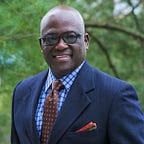Building Bridges
As we honor the legacy of Rev. Martin Luther King Jr., I know I am not alone in trying to reconcile the soaring optimism of Dr. King’s dream with the disturbing events and images of the last weeks and ongoing and escalating racial injustices in our country.
Even in his own brilliant and poetic articulation of his dream, Dr. King acknowledged the gap between his dream and reality. In his famous speech, Dr. King said, “1963 is not an end, but a beginning.” Sadly, we are still at the starting line and this gap seems even wider today — nearly 60 years later.
There is power in dreaming, but how do we convert dreams into reality? I believe it starts with building bridges. Building bridges is important and difficult work — bridges between those who agree with us and those who don’t, between our ideas and our actions, between our past and a promising future. Building a bridge is one of the most meaningful, impactful skills that we can cultivate, whether in our personal or professional lives, whether on our campuses or in our broader community or beyond. As political activist, academic, and author Angela Davis said: “Walls turned sideways are bridges.”
Especially in this pandemic, when our obstacles now include distances, masks, and fear, building bridges is more critical than ever. On Martin Luther King Jr. Day, while our Champlain College community is not yet all together on campus, I have encouraged us to build bridges with our broader community through learning. Our Burlington, VT community has compiled an excellent schedule of programming, including a panel and discussion hosted by the City of Burlington on reparations, as well as events hosted by Dartmouth College, UVM, and the Greater Burlington Multicultural Resource Center.
As MLK Day is also a day of service, the United Way of Northwestern Vermont has a list of suggested options for volunteering safely through acts of kindness or virtual, at-home, or socially distant activities:
- Create cards for patients recovering from COVID-19
- Letter writing to seniors in nursing homes
- Knitting blankets, hats, or mittens for the homeless
- Contactless food or warm coat donations to a nonprofit
- Individual neighborhood clean-up or “snow angel” shoveling
While the pandemic makes it more difficult to gather in person, we welcome these opportunities for community discussion, reflection, and bridge-building.
